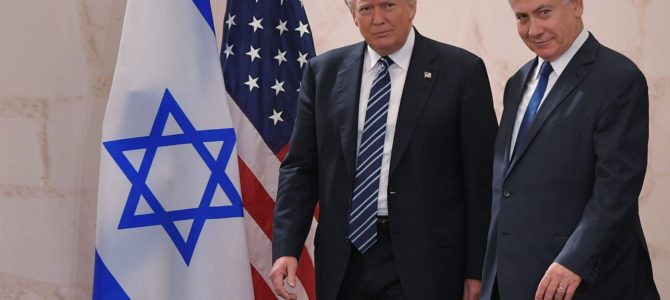
Yesterday, President Trump announced his administration’s much-anticipated “Peace to Prosperity” plan, referring to the policy proposal as a “realistic two state solution” to the Arab-Israeli conflict. Accompanying the announcement came a 180-page document, detailing the political aspects of a plan that the administration had remained largely mum on since first announcing its existence last summer.
Despite the hysterics to which we will inevitably be subjected, this plan is an astute return to normalcy after the heretical anti-Israel pivot that had defined the Obama administration’s foreign policy approach in the Middle East. In fact, many of Team Obama’s policy choices involved an abandonment of our traditional allies in the region, combined with an empowerment of our historical adversaries, in an attempt to “rebalance” the Middle East (whatever that nebulous term means).
A statement released from Sen. Ted Cruz’s (R-Texas) office captured this sentiment well, noting, “Today’s plan marks another important step by the Trump administration to undo the sad legacy of the Obama administration, specifically by rendering United Nations Security Council Resolution 2334 null and void, and in doing so, advances the cause of peace in the Middle East.” UNSC Resolution 2334 declared Israeli settlements — or more simply, the presence of Jews — in Judea and Samaria, as well as in East Jerusalem and the Golan Heights, to be a “flagrant” violation of international law.
Under Trump’s plan, the United States will recognize Israeli sovereignty over the vast majority of Judea and Samaria, including the whole Jordan Valley, a move the administration had been inching towards since Secretary of State Mike Pompeo first declared that Israeli settlements in Judea and Samaria were not regarded as illegal under international law. As Professor Eugene Kontorovich, director of the Center for International Law in the Middle East at the Antonin Scalia School of Law, noted, there is no mention of “annexation” in the plan, a nod to the axiom that you cannot annex that to which you already have a claim.
In exchange, the Palestinian-Arabs have been granted a pathway towards securing statehood, should they choose to accept it. However, the establishment of a Palestinian state will depend upon their leadership fulfilling a host of requirements, including recognizing the state of Israel and its capital, Jerusalem; ending the indoctrination of Jew-hatred in Palestinian schools and cultivating a general culture of peace; halting the state funding of terrorist activities, which accounts for 10 percent of the Palestinian Authority’s budget; working towards the full disarmament of Hamas and demilitarization of Gaza; and other requirements centered on eliminating the government’s role in fomenting antisemitism and violence.
As Kontorovich notes, given the peace plan is supported by both Israeli Prime Minister Benjamin Netanyahu and his main opposition Benny Gantz in the upcoming Israeli election, the peace plan robs the American left of their main mechanism for parroting Obama’s anti-Israel talking points, an exercise that usually consists of stating with some sort of feigned intellectualism, “I’m just opposed to Bibi.” But as the peace plan indicates to us, it’s no longer “just Bibi.”
Trump’s plan sharply recognizes that peace between Israelis and Palestinian-Arabs can occur only when Palestinian leadership prioritizes the establishment of a state over its perennial hatred of Jews. As Moshe Koppel of Jerusalem-based Kohelet Policy Forum pointed out yesterday in the Jerusalem Post, this plan will demand a certain level of vigilance in the coming months in terms of assessing whether the Palestinians are maintaining their end of the bargain by making genuine efforts to establish peaceful relations with the Israelis.
Unlike the approach of past administrations, which remained largely unresponsive to Palestinian violence in the form of continued funding, the plan indicates (at least nominally) a zero-tolerance approach to addressing Palestinian-Arab aggression in the region, requiring a bare minimum of no violence from Palestinian leadership in return for an eventual state. If they fail to meet the most basic requirements of being non-genocidal neighbors, then they will justifiably forfeit a reasonable chance at statehood.
Unsurprisingly, Palestinian President Mahmoud Abbas has already said “a thousand nos” to Trump’s plan, and Palestinian-Arabs have begun the usual playbook of rioting in the streets, lighting tires on fire in a show of their unwillingness to establish any sort of meaningful relations with their neighbors.
The latest response on the part of Palestinian-Arabs indicates a commitment to the same intransigence and manifest rejectionism that has thwarted them from ever achieving statehood in the past. Indeed, since rejecting the suggested partitioning of the 1937 Peel Commission, Arab leaders have impeded the creation of an Arab state west of the Jordan River more than six times, depending on whether one considers refusal to talk to mean refusing the possibility of a state.
Last June, Palestinian leadership convinced their people to riot in response to the release of the economic portion of the White House’s plan, which featured a $50 billion Palestinian investment and infrastructure proposal geared towards boosting the earnings of Palestinians living both inside and outside of the territories. Similar to the Palestinian response yesterday, the rioting and violence that followed was nothing short of self-sabotaging and incoherent.
Thus, if anything is to be gleaned from the events of last summer and of this week, it is that the Palestinian leadership does not have a genuine interest in bettering the lives of their own people—and that they are wholly unprepared and uninterested in actual statehood.









